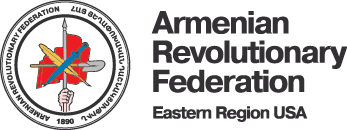The ARF officially re-emerged in Armenia in 1990 as the Soviet Union was dissolving. On December 28, 1994, the government of then-President Levon Ter-Petrossian “temporarily suspended” the ARF’s activities, although the ARF continued to operate in Armenia. Armenia’s Justice Ministry lifted the ban on the ARF on February 9, 1998, less than a week after Ter-Petrossian resigned.
In 1998, the ARF supported the candidacy of Robert Kocharian, whose eventual election let to the appointments of ARF members as government cabinet ministers and presidential advisor. Kocharian was succeeded by Serzh Sarkissian, who was elected president in February 2007.
The ARF aligned itself with Sarkissian government, but effective April 27, 2009, the ARF announced the cessation of its participation in the governing coalition due to deep and irreconcilable differences with Sarkissian over his engagement with Turkey to open the Armenian-Turkish border with regressive pre-conditions harmful to Armenia’s moral and physical integrity and stability. Today, the ARF participates in Parliament and in Armenian civic society to convey constructive criticism of the Government of Armenia and alternative proposals for a secure, well-positioned Armenia.
The ARF issued the following statement to explain its departure from Armenia’s governing coalition:
We deem it necessary to explain this step in view of its political significance and consequences, and the public’s interest.
First of all, the ARF joined the coalition in order to overcome, through uniting of forces, the crisis facing the country following the presidential elections and the threats to the independence and security of the two Armenian states, and with the aim of making coordinated reforms.
During this period there were certain achievements, but insurmountable disagreements on matters of principle emerged with respect to the direction of the foreign policy.
It has always been our conviction that one of the main directions of the state’s national security strategy is the universal recognition and condemnation, especially by Turkey, of the Armenian Genocide. This is seen not only in the context of the restoration of historical justice, but also as a way to improve the overall environment of mutual trust in the region, while also preventing similar crimes in the future. In this sense, as we have already announced, we find unacceptable and condemn the agreement by Armenia’s Ministry of Foreign Affairs to join the April 22 joint statement with Turkey, on the eve of April 24 and when the leaders of Turkey are making anti-Armenian announcements and restating preconditions for the normalization of relations. We also have principled disagreements with the position of the authorities of Armenia on certain issues being discussed in the Armenia-Turkey negotiations. We will publicize our positions regarding those issues when they are discussed in public.
Henceforth, in the political landscape of Armenia the ARF will assume a new role, that of an opposition force. Our main priorities will be:
1. To become a full-fledged alternative to the authorities, proposing our own programs and solutions on all major issues.
2. As opposition to assume the role of effectively counterbalancing and restraining the authorities.
3. To take the necessary actions to heal and refine the political landscape, to form civilized relations between the authorities and the opposition, to establish social justice and to strengthen democracy.
4. To carry on comprehensive programs emanating from electoral promises, showcasing the ARF’s ideological and political convictions.
5. In the processes of normalization of Armenian-Turkish relations and the resolution of the Karabagh conflict, to be guided exclusively by our state-national interests and goals.
We appreciate the work carried out jointly with our coalition partners and we wish them success in their endeavors in the interest of our state and people.
Armenian Revolutionary Federation
Supreme Body of Armenia
April 27, 2009
